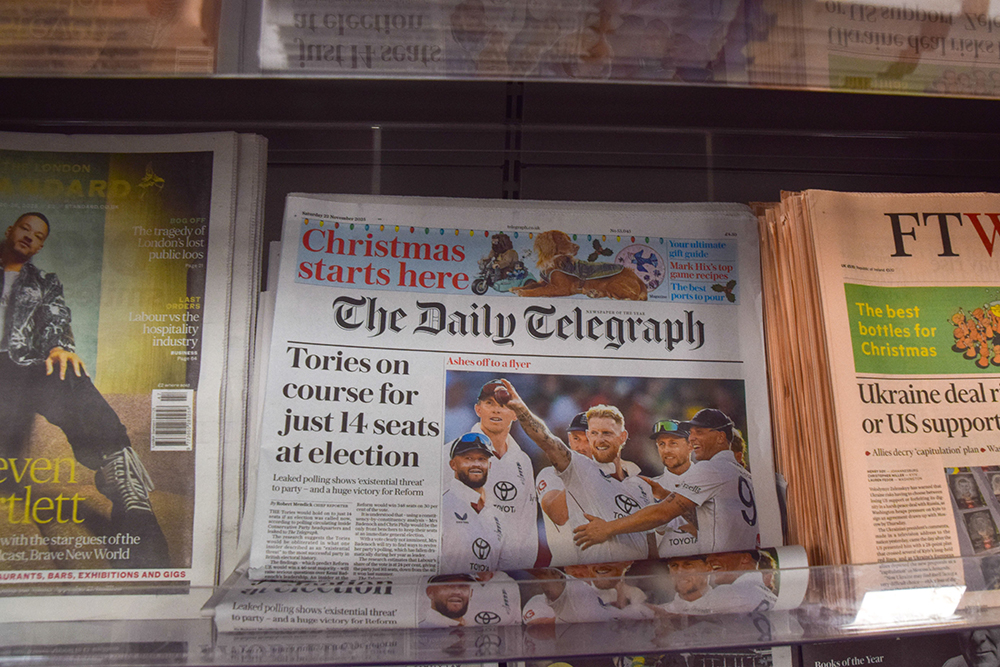
When I first joined The Spectator under the proprietorship of Conrad Black, we operated in sisterhood with the Telegraph titles which he also owned, and no one objected to the Daily Mail ringing the Spectator house in Doughty Street most Fridays to buy the best of the week’s articles for re-publication or to commission the authors to rewrite them in humourless Mail house style. In short, there were frequent meetings of minds in our grove of the media forest.
Three decades later, The Spectator sails confidently on under its new owner while the Telegraph – orphaned when the Barclay family lost control to Lloyds Bank in 2023 and the subsequent Abu Dhabi-backed RedBird IMI takeover was thwarted by legislation – looks destined to join the family of Lord Rothermere’s Daily Mail and General Trust (DMGT).
Assuming Culture Secretary Lisa Nandy and competition regulators don’t stand in the way, the reported £500 million deal will consolidate the UK’s non-Murdoch right-of-centre daily press. But will it also constitute – as the former Financial Times editor Lionel Barber told the Guardian – ‘a very British stitch-up’? Or worse, according to the Labour insider Tom Baldwin, a tightening of the Mail’s ‘pernicious grip on Britain’s media’ that might even threaten democracy? I beg to differ.
News and comment are now consumed from such a multiplicity of online and social media sources, while newspaper circulations steadily decline, that the danger is long gone of an oligopoly of powerful owners promoting their own prejudices. If the Labour government has few friends anywhere in today’s commentariat, it’s because Sir Keir Starmer’s crew are as incompetent in news management as they are in policy delivery, not because they’re victims of the putative right-wing conspiracy that (again I quote the Guardian) claimed the scalps of Angela Rayner and the BBC’s Tim Davie.
The Telegraph, wherever it finally lands, is hardly likely to adopt an even fiercer anti-Labour line than its columnist Allister Heath’s recent ‘Britain has a 75 per cent chance of going full banana republic’. And it would certainly benefit from the formidable back-office skills of DMGT. The new regime might start, incidentally, by updating Google data (in the right-hand column if you search ‘Telegraph’) which still shows the owners as ‘David and Frederick Barclay’.
Real voices
Amid a final frenzy of midnight-oil Budget rewrites, I hope Rachel Reeves had time to read an interview in the Times with small business owners in her Leeds West and Pudsey constituency. ‘Leave us alone,’ pleads a software entrepreneur with six employees –the broad theme of the piece being that he and his neighbours were longing for certainty after months of spin suggesting all manner of tinkering tax changes that might do them harm. ‘The only way we’re going to get growth is if we have small businesses generating it, rather than hampering them,’ says an Indian restaurant owner who’s also a shop landlord and patron of the local hospice. Last year’s national insurance raid had been ‘a death sentence’ for some and ‘hit charities and care services hard’ too.
That last point might also have led the Chancellor to research by the wealth manager Rathbones and the Charities Aid Foundation: not only has the NIC hike hit charity operating costs, but more than a third of UK adults afflicted by the cost-of-living pinch have cut back or stopped giving, reducing the number of donors to its lowest level for a decade, while almost a third of regular charity volunteers have reduced their hours or given up completely. So the safety net for the inadequacies of state provision has itself been severely wounded by state action.
But how often do ministers heed real voices telling them what they don’t want to hear? Another recent survey found 62 per cent of smaller firms ‘feeling the government does not understand their needs’: how abject is that as a failure to listen?
Gone tomorrow
On the principle of using Budget week to bury other controversial news, the transport secretary Heidi Alexander has come out in favour of Heathrow’s £49 billion plan for a new runway that involves re-routing the M25. The scheme is opposed by major airlines for fear of higher landing charges and has been called ‘unaffordable’ by the industry body IATA – but preferred over an alternative proposal from the hotel tycoon Surinder Arora for a shorter runway, at roughly half the cost, that would have left the motorway untouched. No doubt the minister has her reasons and if environmental objectors are defeated, the project might even see diggers on site before a 2029 election. But one thing’s for sure, no member of the current cabinet will be in office to take responsibility when costs spiral and completion dates evaporate in the mid-2030s.
Jeremy vs Ed
And so the circus moves on. When we’ve finished chewing over the Budget, the spotlight may at last return to the issue of energy costs that are by far the highest in Europe for UK industrial users, thanks to the failed energy strategies of successive governments but also to the Energy Secretary Ed Miliband’s apparently unstoppable net-zero zeal.
I’m reminded of a Doncaster industrialist I once quizzed on a plane to Majorca about Miliband’s record as the local MP. Had Ed ever visited his metal-bashing factory or sent him a message? No. Or ever done anything helpful at all? No. So what did he think of Labour generally? ‘Absolutely bloody useless… They’re supposed to be for the workers, but they’ve never done anything for my workers, I can tell you.’
How entertaining it will be, by the way, if Doncaster-born Jeremy Clarkson fulfils his threat to stand against Miliband at the general election: a last comic sideshow to the demise of an unheeding government, but far too late for so many crippled businesses.








Comments